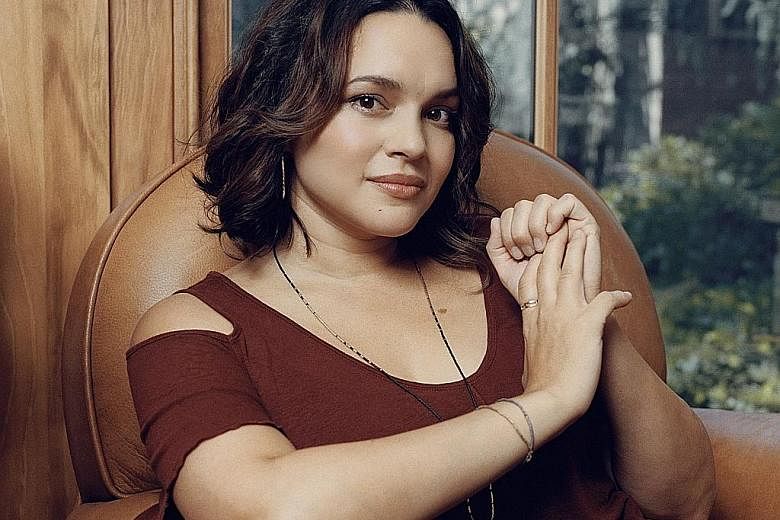NEW YORK • Moments before taking the stage at the Newport Jazz Festival in late July, Norah Jones paused to reflect on her ties to the tradition it represents.
"Sometimes, I feel like a jazz dropout, you know?" she said in her trailer, wearing a floral print summer dress. "But whenever I'm around those people, from high school or college or my early days in New York, everybody makes me feel like part of the family."
Jazz, or at least her homespun take on it, brought Jones one of the most decorated albums in recent history. Come Away With Me, her 2002 debut, took home eight Grammy Awards, including Album of the Year, and has sold more than 11 million copies.
She trained as a jazz pianist and singer, and signed with Blue Note Records, before sidling over to the countrified folk and low-gloss pop that marked her three subsequent albums, from 2004 to 2009, all certified platinum.
A first-time Norah Jones performance at the Newport Jazz Festival in Rhode Island, the world's oldest and still one of its most prestigious, was both an overdue and unforeseen event. It is no coincidence that the festival hit maximum capacity, for the first time in more than 15 years, on the day that her name was on the bill.
She made the occasion a public preview of her new album, Day Breaks, which brings her back into the jazz fold without taking the safe or familiar route.
Due on Oct 7, it features jazz artists such as saxophonist Wayne Shorter and bassist John Patitucci. And when she took the stage at Newport with several other musicians from the album, including the drummer Brian Blade, the message was clear: Rather than making some sort of prodigal return, she was accessing her musical core.
When she got to Flipside, a turbocharged new rhythm-and-blues tune, she belted the chorus, but compressed just as much feeling, at a cooler temperature, into the second verse: "I finally know who I'm supposed to be/My mind was locked but I found the key/Hope it don't all slip away from me."
Weeks later, at an interview, she allowed that those lyrics reflected her state of mind.
"I feel comfortable with myself in a way that I probably didn't 10 years ago," she said. "I think that's probably what happens when you get older."
She is 37, the mother of a toddler son and a daughter born several months ago. But Jones seemed well rested and at ease.
And she enjoyed her Newport Jazz Festival experience.
"I thought that the whole set was pretty sloppy, but loose and fun in all the right ways," she said.
She happens to be angling towards jazz at a moment when its pulse can be felt through a lot of pop music: nestled in the style of hip-hop artists such as Kendrick Lamar and pop megastars including Beyonce; in the touring bands of soul survivors such as D'Angelo and Maxwell; in the bloodstream of vanguardist electronic producers such as Flying Lotus; all over a valedictory recent album by David Bowie.
But the spark for Day Breaks can be traced to a single moment two years ago at the Kennedy Center in Washington, when she appeared on a 75th anniversary concert for her label and performed I've Got To See You Again, a smouldering tune by Jesse Harris, with a group that included Shorter, Patitucci and Blade.
"When I started thinking about making a 'jazz record', mostly I was thinking about recording with Wayne and Brian," she said. "I didn't want it to be standards. I was hoping for something rhythmic, with Wayne floating over the top."
Jones, who has played more guitar than piano in recent years, added of Day Breaks: "I think even more than a return to jazz, it's a return to the piano."
She did not shy away from topicality either.
The song Flipside takes issue with societal oppression and run- away gun culture. It's A Wonderful Time For Love has a jaunty cadence, but lyrics that nod towards the darkness.
"I just thought, 'The whole world's kind of falling apart right now,'" she said.
Her autumn tour will feature her regular working band, and, with luck, include the standout Neil Young cover she included on Day Breaks - a deep cut called Don't Be Denied, from 1973.
The song is about bitter disillusionment and the hard-fought wisdom that casts a sceptical eye on the meaning of commercial success.
The chorus consists entirely of the title phrase, "Don't be denied". Jones sings it a total of 19 times, making it sound both like a reassurance and a battle cry.
NYTIMES

